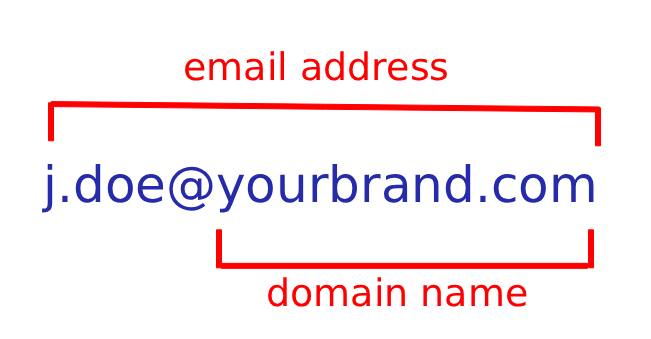Domain based business email are email accounts that use a custom domain name, such as name@yourbrand.com, instead of a free personal one like @gmail.com or @yahoo.co.uk.
This provides a more professional appearance, builds your brand, and reassures your customers that you are an established business. Using a free personal email account could easily be the difference between securing business or missing out.
What is domain based business email?
An email domain is the part of an email address that comes after the “@” symbol. This identifies the email server that is receives and sends emails on behalf of the user / owner of the domain name. Email addresses all have email domains in them, but your email domain is just one part of your email address.
Think of it this way: your email address = [your username + @ + your email domain].
 If you use one of the free personal email accounts like Gmail or Yahoo, then you are using their email servers. If you use Gmail as your email server, the domain name for your email address is gmail.com.
If you use one of the free personal email accounts like Gmail or Yahoo, then you are using their email servers. If you use Gmail as your email server, the domain name for your email address is gmail.com.
This is fine for personal use but not for business.
A custom email domain is specific to you or your business. Instead of your email ending in @gmail.com, your email address with a custom email domain would end in @yourbrandname.com
The custom email domain will be related to the company name, web address or some other trading name. Even Google itself doesn’t use the Gmail domain — Google’s email domain is google.com instead.
Another example is the British home improvement chain B&Q – they use the domain diy.com for their website and customer facing email – https://www.diy.com/ – so if you email them using their contact the reply comes from a @diy.com email address. Only numbers or letters are allowed for domain names so they couldn’t use the ‘&’
Businesses use these custom email domains to establish credibility and project professionalism. Yes, you could use a gmail.com email address for your business, but this a missed opportunity for branding and boosting credibility.
For businesses, other benefits of using a custom email domain include:
- Standing out from your competition
- Establishing your brand
- Staying out of customers’ spam filters
- Standardizing all company emails
- Granting you more control over employee email accounts
Select an email domain that captures your brand or personality to make you domain based business email really work well for you.
Choosing a domain name
The first step to getting domain-based business email is acquire a suitable domain name.
We can purchase this for you or could buy your own domain with companies like Go Daddy, 123 Reg, Namecheap etc. That’s not the hard bit. Deciding on your domain is a critical decision. You might have a specific idea, or base it on in your company or trading name.
If the name is already taken then you might be able to negotiate with the current owner or, more realistically, try something else.
Once you own a domain name, you can then get started on creating
Your email domain will often be one of the first things people see when they contact you. It should help identify your brand and create a strong impression.
Business owners often use their business names (or close variations) as their email domains. For personal use, you might want to make your email domain your full name. Whatever you choose, make sure it’s professional and appropriate.
Here are some tips to help you pick a great business email domain:
- Reflect your brand: If you can, choose a custom domain that matches your business name. This helps make your email address more recognizable and memorable.
- Keep it simple: Select a domain that’s straightforward, short, and easy to spell. If you share your email address with somebody verbally, they should be able to remember and spell it correctly.
- Choose the most appropriate TLD (Top Level Domain e.g. .com, .co.uk .org etc): If you have an international business then .com is best however you may also consider more tailored TLDs to reflect your location, e.g. .co.uk or type of business e.g. .org for a charity or NGO.
- Check for trademarks: Make sure your domain doesn’t infringe on any existing trademarks.
- Localize if necessary: If your business provides services in a specific location, consider including your city or region in the domain – for example our clients dialacabrugby.co.uk
- Research similar domains: Before settling on a domain, check to see if there are existing domains that are similar enough to confuse your customers.
- Future-proof your choice: Make sure your email domain will still make sense as your business grows and expands.
- Register quickly: Once you’ve got the perfect domain, snag it before someone else does!
- Buy the variations: Once you have decided on your domain consider buying variations.
Remember, sometimes, the email domain you choose isn’t available. They’re exclusive, so if someone already has the email domain you want, you’ll have to select another one. Don’t get discouraged if your first choice isn’t available – there are still plenty of great options available.
Get in touch with Dinesh on 07941 686113 or contact us if you need help with domain based business email web design, web hosting, SEO services or domain names.





